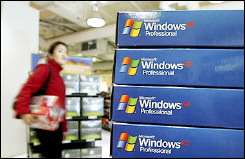New Windows tool checks for piracy

In an attempt to curb piracy of its Windows operating system, Microsoft Tuesday put out a tool that checks whether a PC is running a copy of Windows that is fully licensed.
If a PC is using a counterfeit version of Windows, the tool produces an alert during startup and randomly while the PC is in use, which tells users, "This copy of Windows is not genuine; you may be a victim of software counterfeiting."
While the tool is optional to install, it is being offered through Windows Automatic Updates, which is enabled by most users.
The tool is part of Windows Genuine Advantage, Microsoft's anti-piracy campaign, which launched in the fall of 2004. Since then, users of counterfeit versions of Windows have been unable to download any Windows updates or add-ons aside from security updates.
Additionally, Microsoft has begun a similar program for its Office software bundle, where unlicensed users cannot download software updates.
Cori Hartje, director of Microsoft's Genuine Software Initiative, said that the purpose of this is to inform customers who were sold counterfeit software by an unscrupulous dealer.
"The best way to protect consumers is, first, to educate them about the issue, then to equip them to spot counterfeit software, and finally, to help them understand what they should do about it," she said. "That's why we are working to build new tools such as the WGA notifications feature that can help consumers be confident that the software they are using is genuine."
Users of counterfeit software who are willing to identify who sold them the software and give Microsoft the counterfeit software will receive a free copy of Windows. Additional discounts will be offered to users of counterfeit software who help lead Microsoft to the seller.
Joe Wilcox, senior analyst for Jupiter Research, said that Microsoft's strong anti-piracy stance makes sense in the U.S. market, where two-thirds of the company's revenue derives.
"Within the market, Microsoft is looking for ways to squeeze out additional revenue," he said. "The biggest competitor is piracy, not another operating system."
However, Wilcox said, there is a hidden risk in aggressively pursuing piracy in emerging markets, where piracy has become rampant.
"If Microsoft gets to aggressive, it will drive users to use something different," such as open-source software, he said.
"That would be worse than if they used pirated software," Wilcox said, because instead of having customers who may eventually purchase their counterfeit software, those customers will become entrenched in a non-Microsoft product.
Wilcox said Microsoft was smart to continue offering security updates to counterfeit Windows users, to try to quell the preponderance of viruses and remote-access Trojans across the world.
"Every computer infected with something potentially hurts every other Microsoft computer," he said. "It's in the best interest of Microsoft and its customers to give pirated machines the newest security updates to try to minimize risk."
Additionally, being helpful toward users who mistakenly bought counterfeit software makes them less likely to dislike the company, Wilcox said.
"There's a risk in Microsoft going after its customers to get to the bad guys," he said.
Wilcox said that Microsoft has to be careful to attack the piracy problem while not driving customers to other products.
"One of Microsoft's top priorities should be establishing their product as the top choice," he said. "Pirated customers can become paying customers. They know pirates will be promoting the software."
Copyright 2006 by United Press International
















